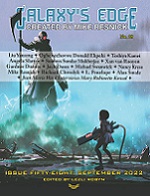 Galaxy’s Edge #58, September/October 2022
Galaxy’s Edge #58, September/October 2022
“Death’s Apprentice” by Soumya Sundar Mukherjee
“Make a Memory With Me” by Xan van Rooyen
“By the Weeping Gate” by Angela Slatter (reprint, not reviewed)
“Last of His Kind” by Toshiya Kamei
“The Gods of Mars” by Gardner Dozois, Jack Dann, & Michael Swanwick (reprint, not reviewed)
“Destiny Delayed” by Oghenechovwe Donald Ekpeki (reprint, not reviewed)
“The Incarceration of Captain Nebula” by Mike Resnick (reprint, not reviewed)
“The God Tree of Banbi Village” by Liu Yanzeng
Reviewed by Victoria Silverwolf
This issue has a strong international flavor, with a quartet of original stories from authors around the globe.
In “Death’s Apprentice” by Indian writer Soumya Sundar Mukherjee, a teenager is fated to replace the previous incarnation of Death. The elder Death plans to join his lover, the retiring incarnation of Life. Strange beings, not subject to the usual rules, threaten to undo the balance of life and death.
The premise reminds me of Piers Anthony’s 1983 novel On a Pale Horse, although the plot goes in a different direction. The beings mentioned above seem like science fiction creations, upsetting the story’s mythic mood. The identity of Life’s apprentice is supposed to provide a twist ending, but the astute reader will be able to predict it.
“Make a Memory With Me” by South African writer Xan van Rooyen takes place in a future world where memories can be removed from one person and transferred to another. The protagonist voluntarily loses his painful memories at first, but then goes on to sell other memories for money. An encounter with another donor leads to a mutual decision.
The concept is an interesting reversal of Philip K. Dick’s 1966 novelette “We Can Remember It for You Wholesale.” The plot is simple, and the work is better appreciated as a character study rather than as a fully developed story.
In “Last of His Kind” by Japanese writer Toshiya Kamei, a scientist reanimates a monstrous, cannibalistic being. The creature, frozen for centuries, has its genetic structure changed to render it harmless. The hidden purpose of the project causes the scientist’s child and a friend to act on their own.
Although pure science fiction in all other ways, with space stations and an Earth devastated by environmental damage, the presence of an ancient entity from folklore adds a strong note of fantasy. The two genres do not always blend smoothly. The youthful protagonist and the mood of the story suggest that it would best be suited for younger readers.
“The God Tree of Banbi Village” by Liu Yanzeng, translated from Chinese by Roy Gilhan, takes place in a remote mountain community in 1945. The inhabitants worship a pair of mulberry trees as deities, because messages appear on their bark revealing the future. A man investigating the trees has his own secret motive revealed by them. An epilogue set in the near future explains the strange way the trees provide their predictions.
For a Western reader, the main appeal of this story is the portrait it provides of an unfamiliar time and place. The mystery of the trees is intriguing, but most will be able to predict the reason for their seemingly supernatural ability. The work might have been more effective without its explanatory epilogue.
Victoria Silverwolf has never been to India, South Africa, Japan, or China.